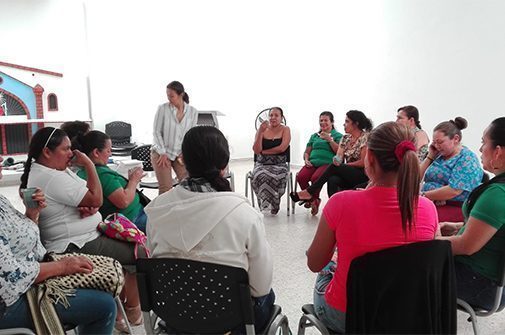The EUROsociAL+ programme is supporting a pilot project in the municipality of Planadas-Tolima, which aims to implement a mechanism and tools to provide effective access to justice for rural women and thereby promote the recognition of their rights.

In Colombia, rural women account for about 10% of the total population of the country and 47% of the rural population, according to the last census. They are involved in the life of rural communities and contribute to cultivating land as well as, more generally, to agricultural development. However, their work is often invisible: for example, the salary for the work they do is sometimes not taken into account in the profits from a plot. This has to do with the fact that forms of ownership and production in rural areas – legal provisions, community practices and family models – rarely recognise their land rights: in most cases, men are the owners and make the decisions concerning the plots. In this context, they come up against barriers in accessing justice and therefore in enforcing their rights with respect to agricultural production and property.
No peace without agrarian justice
The support provided by the EUROsociAL+ programme was requested by the Colombian authorities. It therefore aims to help give greater recognition to the role of rural women and their involvement in decisions related to agricultural property and production. More specifically, the programme is assisting the Colombian Ministry of Justice and Law with the establishment of a mechanism that ensures greater access to justice for these women living in rural areas, so that they can have their land rights recognised.
This activity is part of the Peace Agreement signed between the Colombian Government and the Revolutionary Armed Forces of Colombia (FARC) in November 2016, which provides for an “integral rural reform”. The objective of this reform is to democratise access to land for farmers and, in particular, landless women farmers, especially in areas affected by poverty and conflict. A special aspect is that it mainstreams the gender issue into reflection on agrarian justice
Creating a mechanism for effective access to justice and land
EUROsociAL+ is supporting this process with technical assistance in three phases (2018-2020). The first phase has made a participatory diagnostic of the situation in terms of access to justice and land for women in Colombia. Two types of barriers have been identified:
• Those resulting from the functioning of public institutions, which do not inform women about their rights properly or do not apply existing rules (for example, the dual signature rule which allows a property to be put in the name of two family members and not only in the name of the head of the household);
• Those resulting from socio-cultural factors and the political context (lack of education, non-recognition of the care economy or of the specific contributions of women, discrimination related to inheritance, loss of land due to forced displacements, armed conflict, social and family violence).
Following the diagnostic work, a mechanism was proposed to build the capacities of institutions and rural women.
Phase 2, which is currently underway, aims to implement the proposals set out in the diagnostic and raise awareness of the mechanism mentioned above at national and regional level. The pilot area will be the municipality of Planadas-Tolima, in the east of the country.
Planadas-Tolima, a pilot municipality
This pilot project proposes solutions to the institutional and socio-cultural barriers encountered by rural women for access to justice, land and other related rights. The proposed solutions are based on two areas:
• Firstly, strengthening institutional actors by training officials responsible for rendering justice, so that they integrate the gender perspective into their decisions. This area is based on the formulation and dissemination of a protocol to cover rural women for the resolution of legal conflicts over access to land.
• Secondly, developing and strengthening the role of rural women’s organisations as channels to both provide advice and disseminate information in terms of rights, in particular about the new allocation processes and the legalisation or restitution of land to displaced women (definition of training content for women’s organisations, educational strategy for the dissemination of rural women’s rights, guide on access to justice for rural women, toolkit, training of women trainers…).
The tools mentioned are designed and prepared by a team comprising a local female expert, who is familiar with the social and cultural reality of the country and is responsible for mainstreaming the gender perspective into the activities, and a European female expert who is experienced in the area of access to justice for vulnerable groups. Their comparative and complementary views have contributed to the success of this intersectoral activity shared between the “Gender” component and “Governance” component of EUROsociAL+.
Phase 3 of the action will be devoted to the evaluation of the pilot project and the development of a mechanism taking into account the lessons learned from this experimental phase.



